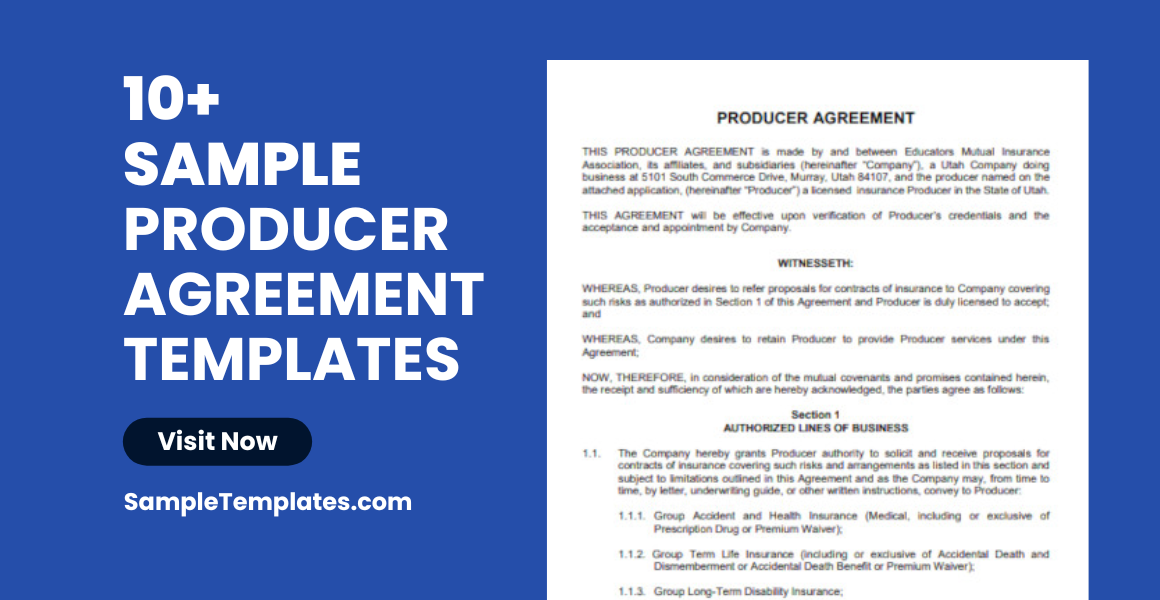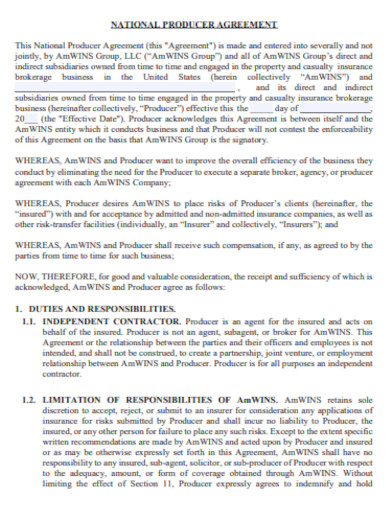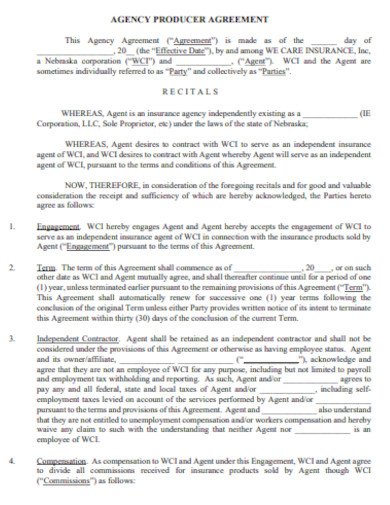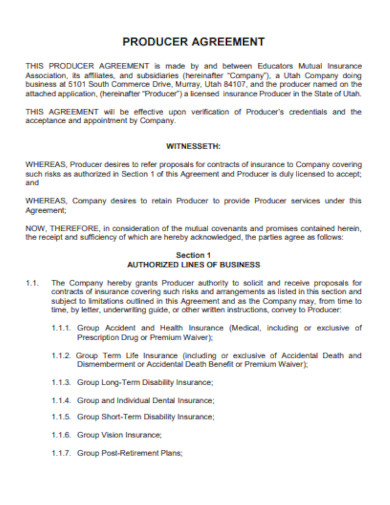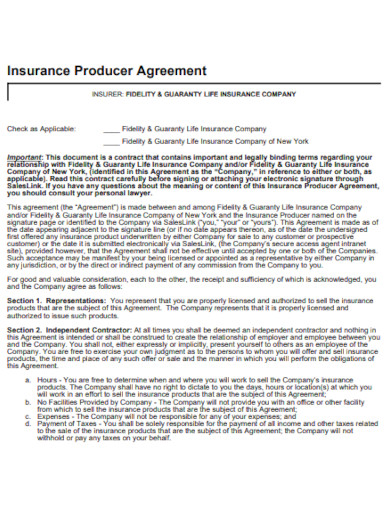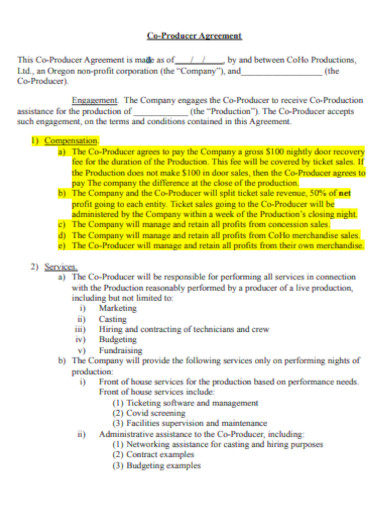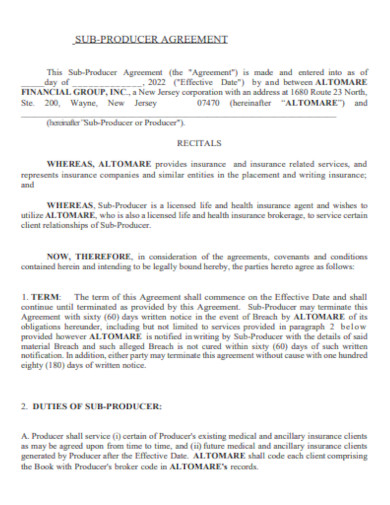10+ Producer Agreement Samples
1. Sample Executive Agreement Template
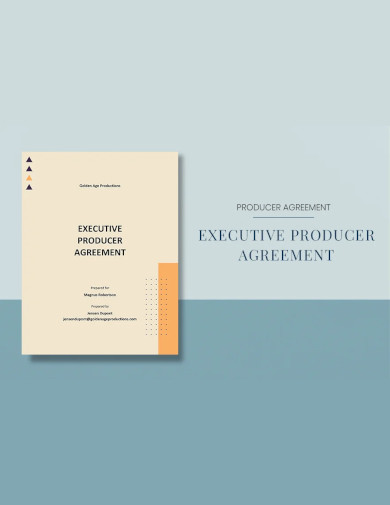
2. Sample Artist Producer Agreement Template
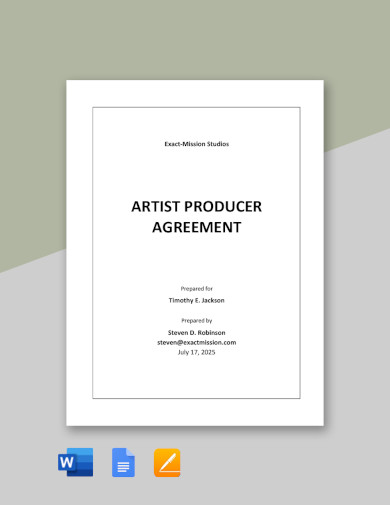
3. Sample Event Producer Agreement Template
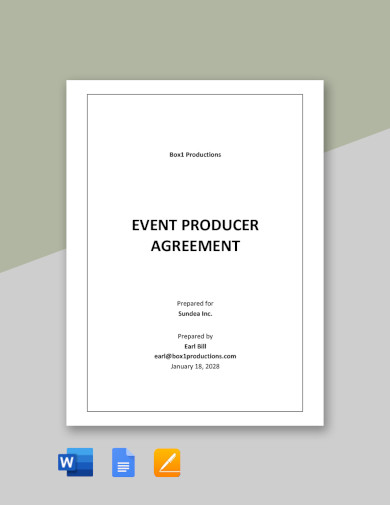
4. Sample Film Producer Agreement Template
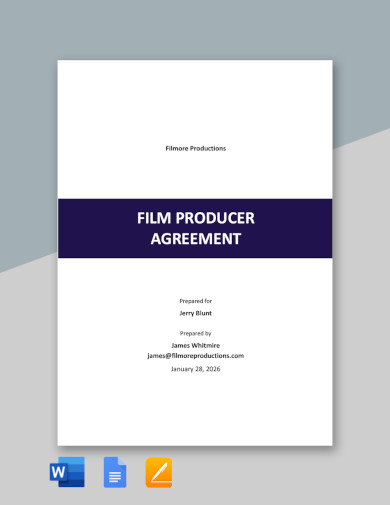
5. Sample Music Producer Agreement Template
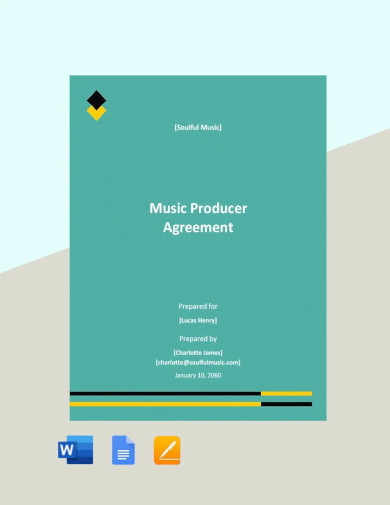
What is a Producer Agreement?
A Producer Agreement is a pivotal legal document in the entertainment industry, particularly in film, television, and music production. This agreement outlines the terms and conditions between a producer and a client, which could be a studio, network, or independent party. It serves as a formal contract that defines the scope of the producer’s responsibilities, compensation, rights, and obligations.
Understanding the Key Elements of a Producer Agreement
- Scope of Work: This section details the producer’s responsibilities. It may include aspects like overseeing the production, managing sample budgets, hiring staff, and ensuring the project adheres to the agreed-upon creative vision.
- Compensation and Payment Terms: Clearly outlines how and when the producer will be paid. This could be a flat fee, a percentage of the budget or profits, or a combination of these.
- Duration and Schedule: Specifies the timeline of the producer’s involvement, including start and end dates, and any important milestones or deadlines.
- Rights and Ownership: Addresses who owns the final product and the rights to distribution. This is crucial for intellectual property and can affect future revenue streams.
- Credit and Recognition: Details how the producer will be credited in the project. This can impact the producer’s reputation and future opportunities.
- Confidentiality and Non-Disclosure: Ensures that sensitive information about the project is kept confidential.
- Termination Clauses: Outlines the conditions under which either party can terminate the agreement, including breach of contract and failure to meet obligations.
The Importance of a Producer Agreement in the Entertainment Industry
- Protects Interests: It legally safeguards the interests and rights of both the producer and the client.
- Clarity and Expectation Setting: Provides a clear understanding of what is expected from each party, reducing the potential for disputes.
- Financial Security: Ensures that the producer is fairly compensated for their work and contributions.
- Legal Recourse: In case of disagreements or breaches, the sample agreement provides a basis for legal action.
6. Sample National Producer Agreement Template
7. Sample Agency Producer Agreement Template
8. Sample Producer Agreement Template
9. Sample Insurance Producer Agreement Template
10. Sample Co-Producer Agreement Template
11. Sample Sub-Producer Agreement Template
How Long Does a Producer Agreement Last?
The duration of the agreement is specified within the contract and can vary depending on the project’s scope and timeline.
Why is a Producer Agreement Important?
It provides legal protection, clarity, and structure for both the producer and the client. It ensures that both parties understand their roles, responsibilities, and benefits, reducing the potential for disputes.
How is a Producer Compensated under a Producer Agreement?
Compensation can vary and may include a flat fee, a percentage of the budget or profits, or a combination of these. The specific terms are outlined in the agreement.
Can a Producer Agreement be Modified?
Yes, agreements can be modified if both parties agree to the changes. The process for amendments should be outlined in the original agreement.
In conclusion, a producer agreement is an essential contract in the entertainment industry, ensuring clarity, fairness, and legal protection for both producers and their clients. It covers various aspects like compensation, rights, responsibilities, and more, making it a comprehensive guide for any production-related collaboration. You can also see more templates like Production Contract Samples.
Related Posts
FREE 10+ Mentoring Agreement Samples In MS Word | Apple Pages | PDF
FREE 10+ Partner Agreement Samples In MS Word | Google Docs | Apple Pages | PDF
FREE 10+ Individual Agreement Samples In MS Word | Google Docs | Apple Pages | PDF
FREE 10+ Strategic Agreement Samples In MS Word | Google Docs | Apple Pages | PDF
FREE 10+ Equity Agreement Samples In MS Word | Google Docs | Apple Pages | PDF
FREE 10+ Grant Agreement Samples In MS Word | Apple Pages | PDF
FREE 8+ Meeting Agreement Samples in MS Word | Google Docs | Apple Pages | PDF
FREE 10+ Community Agreement Samples In MS Word | Google Docs | PDF
FREE 8+ Real Estate Option Agreement Samples in MS Word | PDF
FREE 10+ Call Option Agreement Samples In MS Word | PDF
FREE 10+ Advertising Agreement Samples In MS Word | Google Docs | Apple Pages | PDF
FREE 10+ Car Agreement Samples In MS Word | Google Docs | Apple Pages | PDF
FREE 10+ Horse Agreement Samples In MS Word | Apple Pages | PDF
FREE 10+ Option Agreement Samples In MS Word | Google Docs | Apple Pages | PDF
FREE 9+ Project Management Agreement Samples in DOC | PDF
